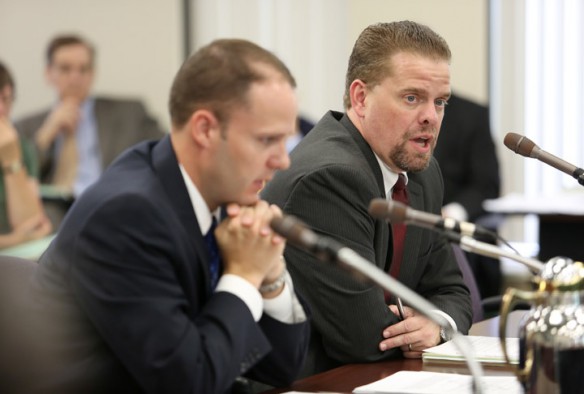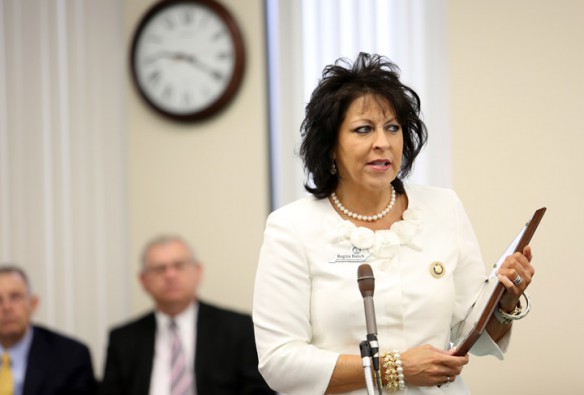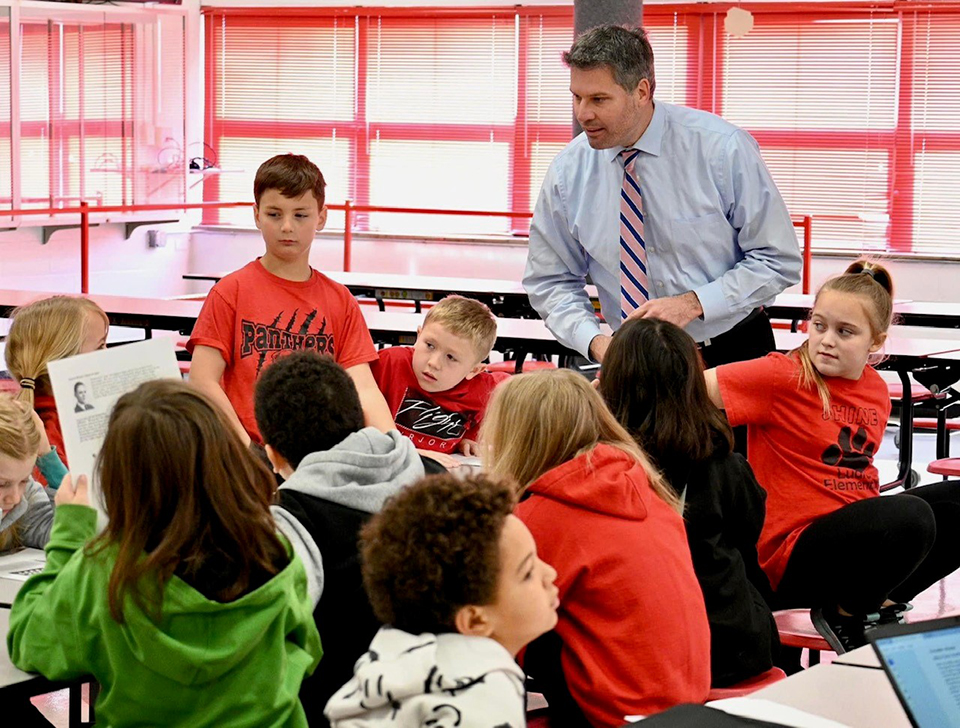
Associate Commissioner Kevin Brown and Division Director David Cook present articles of incorporation for the Fund for Transforming Education in Kentucky during the Kentucky Board of Education meeting in Frankfort, Ky. Photo by Amy Wallot, Aug. 9, 2012
By Matthew Tungate
matthew.tungate@education.ky.gov
All Kentucky teachers will receive annual training on how to reduce the need for physical restraints or seclusion of students under a new policy adopted by the Kentucky Board of Education at its August meeting.
The new regulation calls for school personnel to be “trained to use an array of positive behavior interventions, strategies and supports to increase appropriate student behaviors, and decrease inappropriate or dangerous student behaviors.”
That training, which may be web-based, includes the proper use of positive reinforcement, crisis prevention and de-escalation strategies, as well as identification of a core team of staff trained specifically in the use of physical restraint or seclusion.
The policy also prohibits the use of restraint and seclusion for reasons such as punishment or to prevent property damage without the threat of harm to the student or others. Restraint and seclusion are to be used only under certain conditions, including when “less restrictive interventions have been ineffective in stopping the imminent danger of serious physical harm to self or others, except in the case of a clearly unavoidable emergency situation posing imminent danger of serious physical harm to self or others.”
The regulation also includes requirements for documenting and reporting to parents when restraint and seclusion are used.
General Counsel Kevin Brown told the board that Kentucky has no statute or regulation on the use of restraint or seclusion in public schools. The new regulation is based on guidance from the federal Department of Education, he said.
Three administrators from the Marion County school district spoke at the meeting about the district’s seclusion and restraint policy, which closely mirrors the new statewide policy that will go into effect for the 2013-14 school year.
Director of Special Education Deborah Spaulding told the board that Marion County leaders believe communication and relationships are vital to the policy, which centers on procedures, training and monitoring.
“Any good teacher in any good school has to have guidelines,” she said.
Spaulding said the district does not train its entire staff in seclusion and restraint techniques. The district trained 18 people and two trainers for $5,000, she said. All staff are trained on de-escalation, she said.
Benjy Mattingly, principal at West Marion Elementary School and one of the district’s trainers, said he emphasizes de-escalation techniques to district staff. He told the board de-escalation is just one of many classroom management techniques designed to lead to a safe, nurturing learning environment for students.
“If they don’t feel safe, if the staff doesn’t feel safe, it’s kind of hard to educate them,” Mattingly said. “When students come to my building, our number one priority is safety.”
Spaulding said being physical with a student should be a last resort.
“When we put our hands on the students, we do have them look at us differently,” she said.
The state regulation has to be approved by the Administrative Regulation Review Subcommittee of the Legislative Research Commission before it goes into effect.
The board also discussed three items relating to innovation within school districts: the creation of an independent non-profit organization to help fund programs and two separate regulations related to alternative programs and the designation of “Districts of Innovation.”
The Fund for Transforming Learning in Kentucky will be 501(c)(3) non-profit with its own board of trustees and staff, Brown told the board. He said the articles of incorporation are drafted, and Commissioner Terry Holliday is seeking board members. Brown said the articles of incorporation could be filed with the Secretary of State as early as this month.
Division Director David Cook recently visited the Colorado Legacy Foundation, which is serving as the model for the Kentucky organization. He said the agency has grown from one staff member to 40 in four years, with 10-12 of those staff members working at the Colorado Department of Education.
“I saw an incredible partnership,” he said.
Board member Mary Gwen Wheeler will serve on the foundation’s board.
The alternative education program regulation outlines minimum requirements for alternative programs and requires districts to develop policies and procedures to govern these programs. The policies and procedures must address program goals, eligibility requirements, processes for entry and exit, and parent and student participation requirements. Once a student is placed in a program, an individual learning plan addendum (ILPA) developed by a team (including the parents) is required to address the student’s educational needs in the new setting, according to the regulation.
Interim Associate Commissioner Susan Allred said about 70,000 students per year enter or exit an alternative school. Currently, “alternative” means “for students who misbehave,” Allred said.
“Although it does cover that, it covers much more,” she said. “Any district can have innovation, and this encourages that.”
If the regulation is passed, it would go into effect in 2013-14, Allred said.
The “Districts of Innovation” regulation stems from a law passed this year that encourages school districts to implement innovative educational programs for their students. In exchange, the districts will be given flexibility from selected state laws and regulations and local board of education policies for school administrators, teachers and staff. .
According to the regulation, innovative strategies provide non-traditional approaches to all areas of curriculum, instruction, assessment, governance and school operation and may include:
- moving to a competency-based learning system, including development of alternate methods of delivery of curriculum and of measuring mastery of standards and skills
- creating multiple pathways to graduation including rigorous career and technical pathways, apprenticeships, early college high schools, early graduation options and digital learning opportunities
- rethinking the times and places that learning occur, including lengthen or flexing the school day and school year, moving learning beyond the traditional school building, and incorporating extended learning opportunities
- implementing alternative forms of governance
- designing learning environments that include the student in the design of learning pathways
- creating additional job classifications for certified and classified staff beyond the traditional roles of teacher and instructional assistants, and compensating staff on schedules other than a single salary schedule
Cook said only districts can apply for the designation, and 70 percent of staff in a school would have to vote to support the innovation plan, or a district could create a new school using the innovation plan. Districts would have to reapply every five years, he said.
The board heard updates on several other items, including:
- next-generation science, social studies and career/technical education standards
- state regulation 704 KAR 7:151, which would repeal the Secondary GED Program
- the Energy in Education Collaborative initiative

Rep. Regina Bunch speaks after accepting recognition for her late husband Rep. Dewayne Bunch during the Kentucky Board of Education meeting in Frankfort, Ky. Photo by Amy Wallot, Aug. 9, 2012
In other business, the board:
- re-elected chairman David Karem and vice-chair Roger Marcum
- recognized the late State Rep. Dewayne Bunch, a mathematics and science teacher at Whitley County High School, who died of injuries suffered trying to break up a fight at the school
- recognized State Rep. Derrick Graham, who recently retired as a social studies teacher with the Frankfort Independent school district
- discussed Education Commissioner Terry Holliday’s evaluation and praised the commissioner for his leadership, work ethic and vision
- directed KDE staff to move forward with designing the Articles of Incorporation for the Fund for Transforming Education in Kentucky
- agreed to accept 2012-13 preschool funding rates
- appointed Jennifer Fowler, an 8th-grade English/language arts teacher at Paintsville High (Paintsville Ind.), and LeRonda Morton, an English/language arts teacher at Bryan Station High (Fayette Co.), to the Kentucky Writing Advisory Committee
- approved 704 KAR 3:305, a regulation related to high school graduation requirements
The Kentucky Board of Education will hold a study session and its next regular meeting on Oct. 8 and 9, respectively, in Frankfort.



Leave A Comment